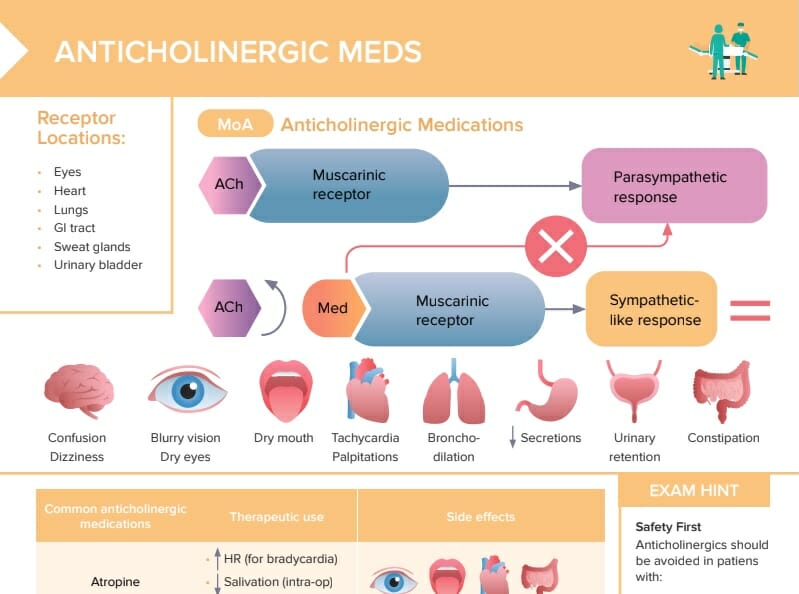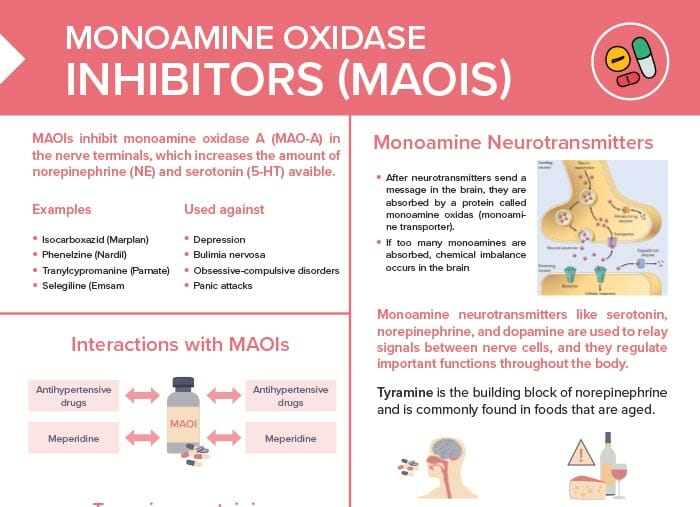What are MAOIs?
Monoamine oxidase inhibitors (MAOIs) are a class of antidepressant drugs that work by inhibiting the enzyme monoamine oxidase, which breaks down monoamine neurotransmitters like serotonin, norepinephrine, and dopamine. Indications are depression, bulimia nervosa, obsessive-compulsive disorders, and panic attacks.
Related videos
What are monoamine neurotransmitters, and what is their role in the brain?
Monoamine neurotransmitters like serotonin, norepinephrine, and dopamine are used to relay signals between nerve cells, and they regulate important functions throughout the body. After neurotransmitters send a message in the brain, they are absorbed by a protein called monoamine oxidase (MAO), which breaks them down. MAOIs inhibit MAO, which increases the amount of neurotransmitters available in the nerve terminals.
Examples of common MAOIs
- Isocarboxazid (Marplan)
- Phenelzine (Nardil)
- Tranylcypromine (Parnate)
- Selegiline (Emsam)
What are the main side effects and potential health risks associated with MAOIs?
Common side effects include dry mouth, nausea, diarrhea or constipation, low blood pressure, insomnia, and weight gain. The most significant risks are:
- Hypertensive crisis: can occur if clients ingest foods rich in tyramine or use certain other medications
- Serotonin syndrome: can occur if clients combine MAOIs with other serotonin-increasing medications or herbal supplements
What is serotonin syndrome and how can it occur with MAOI medications?
Serotonin syndrome is a rare but potentially life-threatening condition caused by an excess of serotonin in the body. Symptoms include agitation, confusion, rapid heart rate, high blood pressure, dilated pupils, muscle rigidity, and fever. It can occur when MAOIs are combined with other serotonin-increasing medications or herbal supplements.
What is a hypertensive crisis and how can it occur with MAOI medications?
A hypertensive crisis is a severe increase in blood pressure that can lead to a stroke. Blood pressure readings higher than 180/120 mm Hg are considered dangerously high and require immediate medical attention. In the case of MAOI usage, a hypertensive crisis can be triggered by consuming tyramine-rich foods, which can cause a sudden, extreme spike in blood pressure.
Drug interactions: Which substances should be avoided during the use of MAOIs?
- MAOIs should not be combined with other antidepressants, most notably TCAs, because it may result in hypertensive crisis.
- They should also not be combined with certain opioids like meperidine, or with serotonergic drugs like SSRIs, MDMA, or other phenylethylamines, as they are likely to lead to serotonin syndrome.
- Foods that are high in tyramine should be avoided while taking MAOIs, as they can lead to hypertensive crisis.
Which foods should clients avoid while taking MAOIs?
Foods that are high in tyramine:
- Aged meats and cheeses
- Sausages
- Bologna
- Pepperoni
- Salami
- Ginseng
- Protein extracts or dietary supplements
- Sauerkraut
- Shrimp paste
- Miso soup
- Yeast
- Alcoholic beverages like Chianti wine and vermouth
- Banana peels
- Bean curd
- Broad (fava) bean pods (contain high levels of L-DOPA)
What is the ‘washout’ period and why is it important in the context of MAOIs?
The ‘washout’ period is the time required for a medication to be sufficiently eliminated from the body before starting another.
MAOIs can have dangerous interactions with other medications, particularly SSRIs, SNRIs, and certain pain medications, so waiting a sufficiently long time before administering the new medication is vital.
The washout period for most MAOIs is approximately 2 weeks, but this can vary.
Clinical tips for caring for clients who take MAOIs
What to do if serotonin syndrome is suspected
Treat as a medical emergency. Discontinue MAOI and any other serotonergic agents and work with the healthcare team to treat symptoms like hyperthermia and provide supportive care.
What if a client has eaten tyramine-rich food?
If a client reports the inadvertent consumption of tyramine-rich food, the affected person should be monitored closely for signs of a hypertensive crisis, which include severe headache, chest pain, shortness of breath, and significantly elevated blood pressure. If a hypertensive crisis is suspected, it should be treated as a medical emergency.
Why is it important to continuously monitor blood pressure?
Hypertensive crisis is a risk with the use of MAOIs. Regular monitoring of blood pressure can help detect any abnormal increases early, allowing for prompt intervention.
How to educate about dietary restrictions
Nurses play a key role in educating clients about the need to avoid tyramine-rich foods and beverages while taking MAOIs to prevent a hypertensive crisis. Make sure to provide a comprehensive list of foods to avoid and encourage clients to always check food labels and ask about ingredients when eating out.

